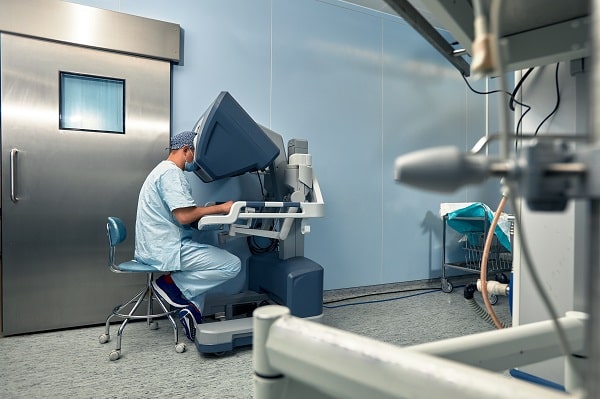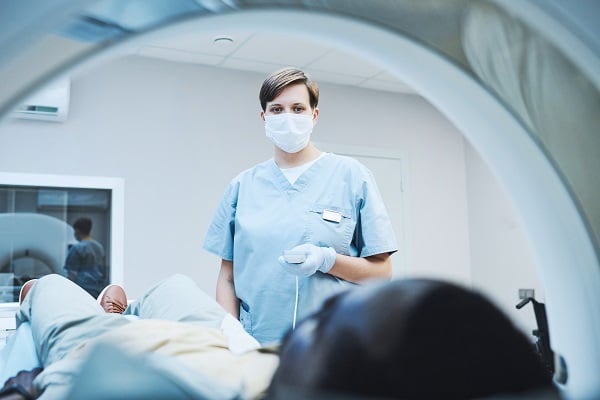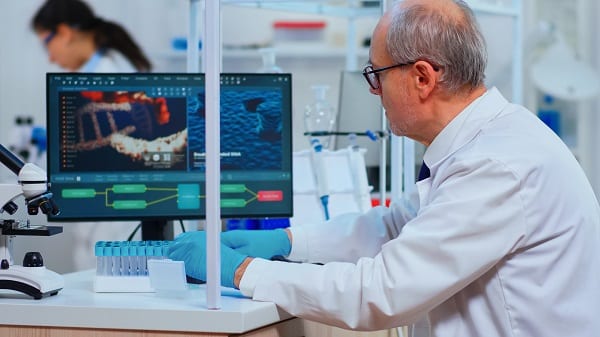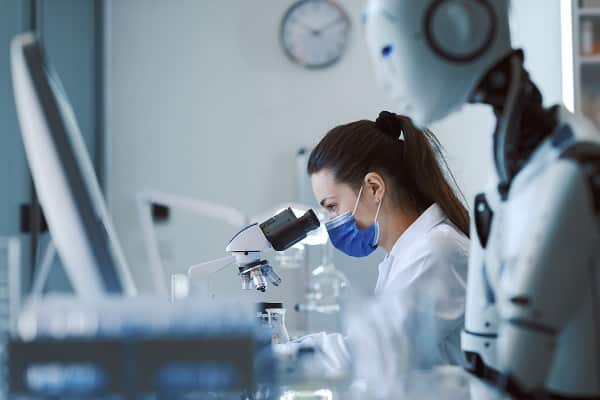The dawn of artificial intelligence (AI) marks a significant shift in various sectors, and healthcare stands as one of the most impacted domains. AI is rapidly transforming healthcare, enabling a revolution that holds promise for more accurate diagnoses and efficient treatment plans. In this article, you delve into how AI is center stage in healthcare, improving diagnostics and reshaping treatments.
Contents
- 1 Diving Into Artificial Intelligence In Healthcare
- 2 The Power Of AI In Disease Diagnosis
- 3 AI In Personalized Treatment Plans
- 4 Artificial Intelligence In Surgery And Postoperative Care
- 5 The Impact Of AI On Medical Imaging
- 6 AI In Drug Discovery And Development
- 7 Overcoming Healthcare Accessibility Issues With AI
- 8 The Future Of AI In Healthcare: Trends And Predictions
- 9 Challenges And Ethical Considerations
- 10 Artificial Intelligence Is Changing Healthcare For The Better!
Diving Into Artificial Intelligence In Healthcare

Artificial intelligence is a facet of computer science that empowers machines to mimic human intelligence—learning, reasoning, problem-solving, perception, and language. In healthcare, this involves creating algorithms that can process vast amounts of data to provide valuable insights or perform tasks typically needing human comprehension and precision. AI’s potential extends across numerous healthcare areas, from patient data management to drug discovery and even direct patient care.
Healthcare has always been a data-intensive field, making it ripe for AI adoption. Utilizing AI, healthcare providers can analyze complex medical data, spot patterns, and generate predictive models for more personalized and efficient patient care. Such extensive use of AI in healthcare has opened a myriad of possibilities, ensuring a data-driven approach to disease diagnosis and treatment.
The Power Of AI In Disease Diagnosis

The early and accurate diagnosis of diseases can dramatically impact patient outcomes, and this is where AI is making a substantial difference. With the ability to analyze and interpret medical images, AI can support radiologists by highlighting areas of concern in scans that might be easily overlooked. One study found that an AI algorithm could identify skin cancer with accuracy comparable to dermatologists, showcasing the technology’s potential.
Moreover, AI can sift through vast quantities of patient data, identifying patterns that signify early warning signs of chronic illnesses like diabetes or heart disease. Predictive algorithms can alert physicians to these risks, allowing for timely interventions. The ability of AI to work with big data sets, coupled with machine learning algorithms, is transforming disease diagnosis, making it quicker, more accurate, and, ultimately, lifesaving.
AI In Personalized Treatment Plans

Every individual is unique, and so is their response to treatments. AI is instrumental in decoding this complexity by creating personalized treatment plans. AI algorithms can analyze an individual’s genetic makeup, lifestyle, and health history, assisting doctors in designing treatments that are most likely to be effective. For instance, in cancer care, AI can help doctors understand a tumor’s genetic makeup and predict which treatments the patient will respond to best.
Additionally, AI can assist with ongoing monitoring of a patient’s response to these treatments, adapting the care plan as necessary. Real-time health data can be continually fed into the AI system, adjusting treatment based on the individual’s response. This capacity for personalization has the potential to improve patient outcomes significantly and reduce unnecessary side effects.
Artificial Intelligence In Surgery And Postoperative Care

In the operating room, AI is breaking barriers. Surgical robots driven by AI can perform intricate procedures with precision beyond human steadiness. These robots, guided by surgeons, can reduce the risk of complications and enhance patient recovery. One such example is the da Vinci Surgical System, which has performed more than six million surgeries worldwide.
Postoperatively, AI-powered systems help with patient monitoring, tracking vital signs, and alerting healthcare staff if intervention is needed. These systems ensure a close watch on patients, reducing the risk of complications and promoting timely intervention if problems occur. This use of AI, both during and after surgery, elevates the standard of care provided to patients.
The Impact Of AI On Medical Imaging

Medical imaging, an essential part of diagnosis and treatment planning, has seen significant advancements through AI. AI can analyze images, identify patterns, and make precise measurements far beyond human capability. This technology is augmenting the accuracy of diagnoses from X-rays, CT scans, and MRIs, among others. For instance, AI applications can detect lung nodules in CT scans, aiding in early lung cancer detection.
Moreover, AI applications can process images much faster than humans can, reducing turnaround times for results. This increase in speed, combined with greater accuracy, improves patient care and outcomes. As AI technology evolves, it is set to become an integral part of medical imaging.
AI In Drug Discovery And Development

The traditional process of drug discovery and development is time-consuming and costly. AI, however, is poised to revolutionize this process. Machine learning algorithms can analyze massive databases of molecular structures to identify potential drug candidates. An example of this is DeepMind’s AlphaFold system, which predicts protein structures and accelerates drug development.
Furthermore, AI can streamline the clinical trial process. It can identify suitable trial candidates, monitor patient responses, and analyze results quickly and accurately. These AI-powered capabilities can significantly reduce the time and cost associated with bringing new drugs to market, facilitating quicker access for patients.
Overcoming Healthcare Accessibility Issues With AI

Access to quality healthcare is a significant challenge worldwide, especially in remote or underserved regions. AI has the potential to alleviate these issues, increasing healthcare accessibility. Telehealth platforms powered by AI can provide medical consultations to patients irrespective of their location. For instance, AI chatbots can deliver primary healthcare advice, guiding individuals to appropriate care.
Moreover, AI can support remote monitoring of patients, enabling care to be provided outside traditional healthcare settings. Patients can use wearable devices to track their health metrics, with AI algorithms analyzing the data to provide insights or trigger alerts for healthcare providers. Such initiatives powered by AI are transforming the accessibility and delivery of healthcare.
The Future Of AI In Healthcare: Trends And Predictions

The integration of AI in healthcare is an ongoing journey, with many emerging trends promising further advancements. AI’s potential to work alongside genomics, for example, could provide unprecedented insights into disease mechanisms, paving the way for breakthrough treatments. Moreover, AI could transform mental health care, providing tools for the early detection and management of conditions like depression and anxiety.
In the future, you may see AI systems that act as personal health assistants, continually monitoring your health and providing real-time advice. However, the pace of these advancements will hinge on overcoming certain challenges, including issues around data security, privacy, and the need for robust regulation.
Challenges And Ethical Considerations

While integrating AI into healthcare can be transformative, it also brings challenges and ethical considerations. Data privacy is a major concern, as AI systems require access to vast amounts of sensitive patient data. Additionally, ensuring that AI algorithms are transparent and unbiased is crucial. AI systems must be trained on diverse data to avoid perpetuating health disparities.
From an ethical perspective, there are concerns about the patient-physician relationship and the potential for dehumanization of care. Professionals need to ensure that while leveraging AI’s potential, the personal touch in healthcare is not lost. Managing these challenges and ethical considerations will be pivotal in determining the success of AI in healthcare.
Artificial Intelligence Is Changing Healthcare For The Better!
The transformative power of artificial intelligence in healthcare is undeniable, with advancements improving diagnostics and reshaping treatments. As healthcare workers harness AI’s potential, it’s crucial to navigate the accompanying challenges and ethical considerations responsibly. With the right balance, AI can undoubtedly revolutionize the healthcare landscape, improving patient care and outcomes on an unprecedented scale.

